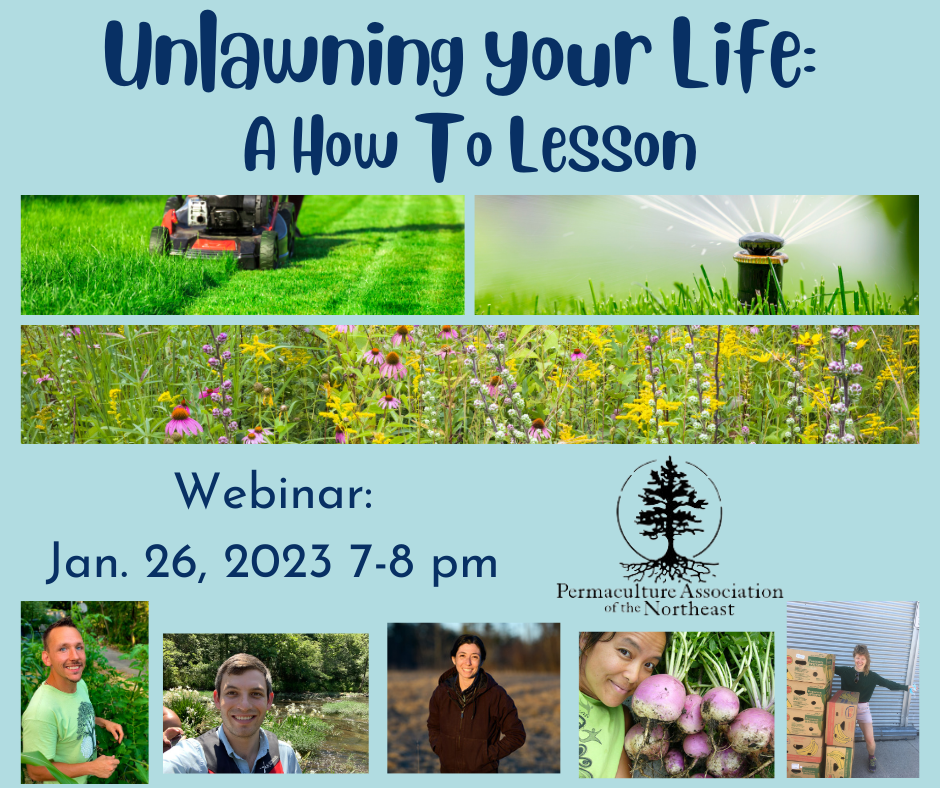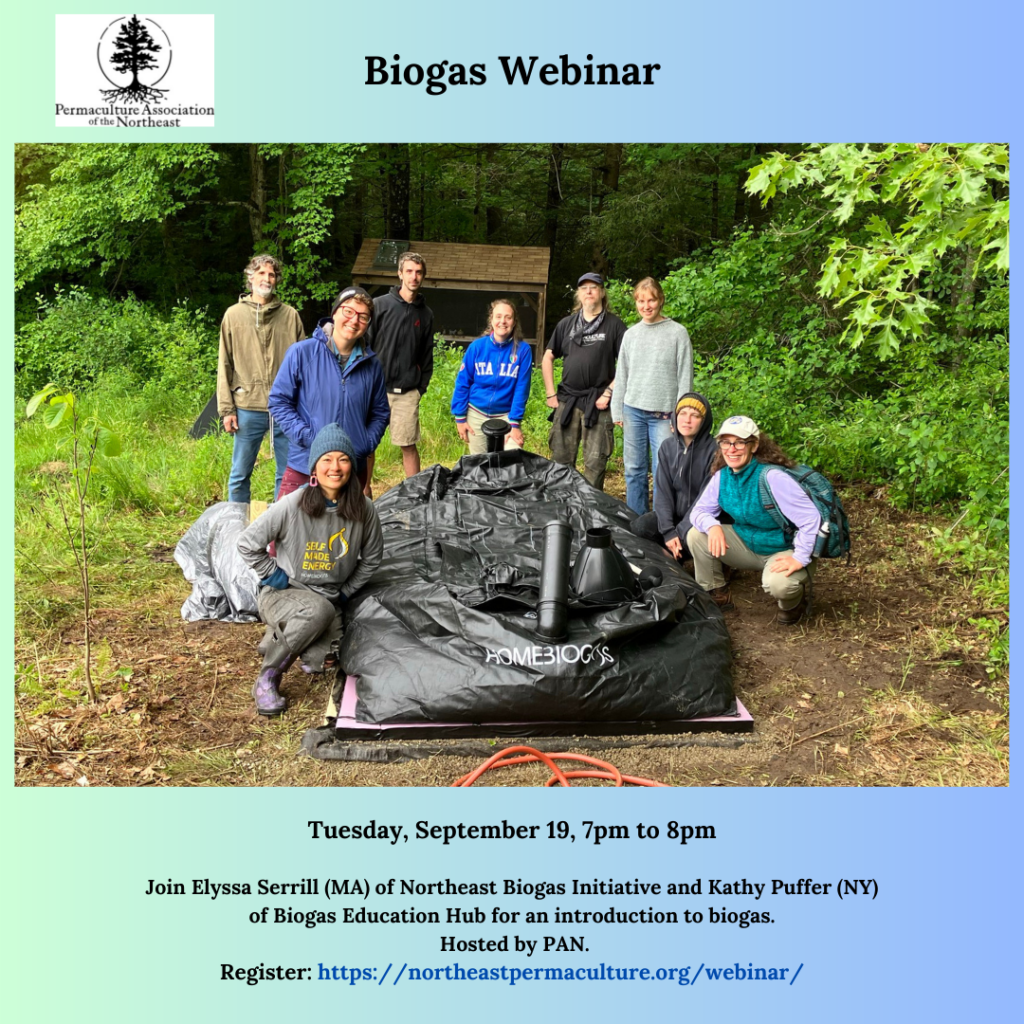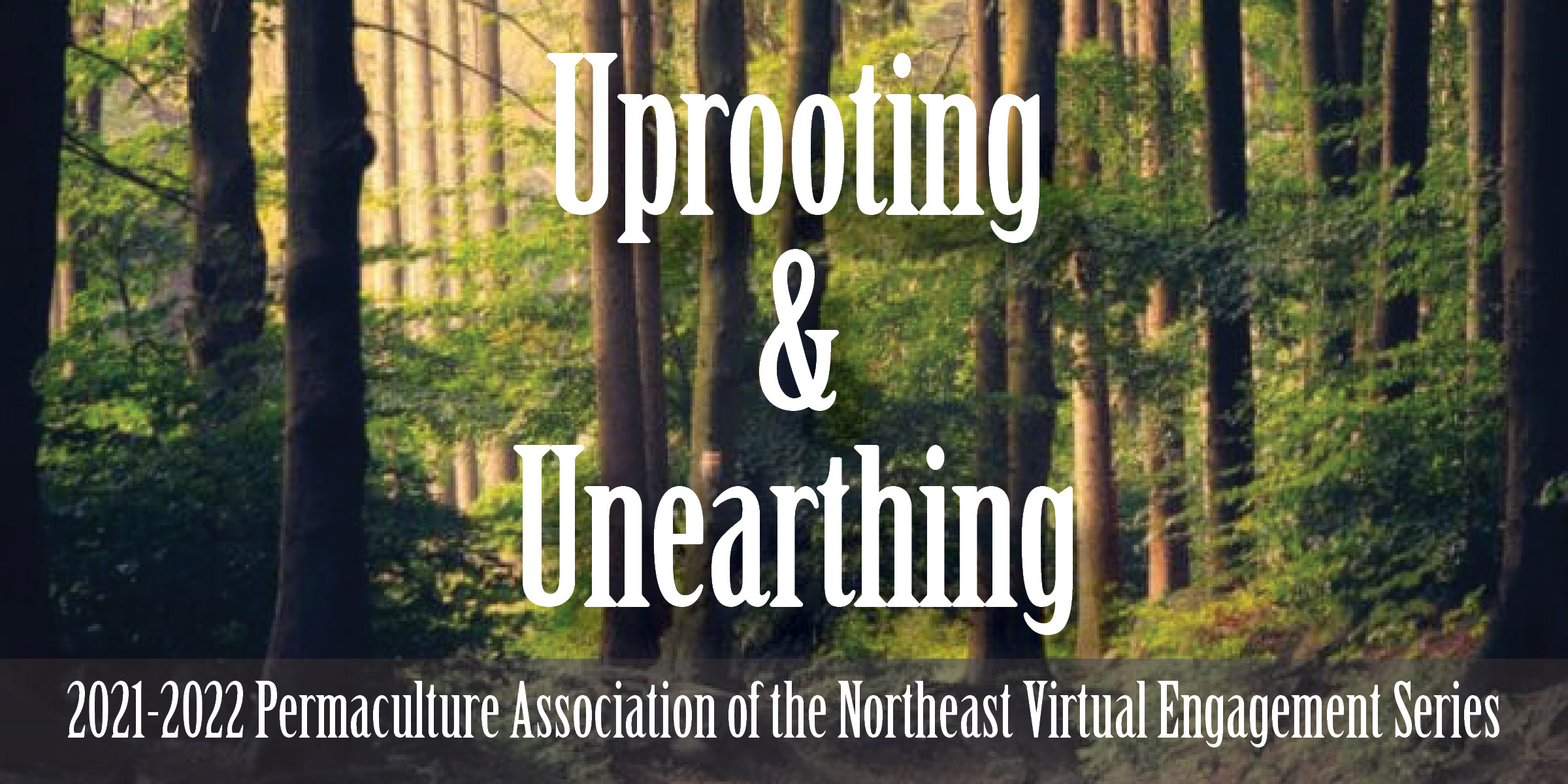FREE RECORDINGS
Teaching Permaculture to Youth: Designing for the Future – November 2023
The climate crisis is here. Its impacts are felt through our bioregion with flooding in New York City, wildfires in Quebec and Ontario, and ever-stronger hurricanes/tropical storms hitting Atlantic states and provinces. The worst of these impacts are being felt by the most vulnerable amongst us and our youth know they are inheriting an unstable future.
Action and solutions are needed. Permaculturists offer our youth tools and skills.
Check out this heartfelt and practical conversation with educators who are on the cutting edge of teaching permaculture design to youth. We invite you to learn more and take action to help.
Grass Lawns: The biggest crop grown in North America is inedible – June 2023
PANdemic Webinar: Permaculture Tools and Strategies in a Time of Crisis and Possibility – May 2020
Check it out… An inspiring conversation with permaculture activists, designers, and educators as we explore questions about mutual aid, people care, and organizing in this time of COVID-19. Moderated by Lisa DePiano, and with panelists: Scott Kellogg, Bonita Ford, Keith Morris, and Adriana Magaña.
Permaculture, Activism, and Spirituality – with Starhawk, October 2019
WANT MORE RECORDINGS?
PAN Members
- Login to your PAN account and go to the “MembersOnly” tab. Free access to our webinars and all past recordings is part of your membership.
Not a PAN member?
- Please make a payment.
- You can make a contribution to support this event. Use the “Pay Now” button below.
- Or, you can become a member for $30/$50/$100 a year and get free access to our webinars and all past recordings as part of your membership.
- Email us at info [at] northeastpermaculture [dot] org to request any recordings.
PAN runs on a small budget, and your membership or contribution helps to pay for coordination, administration, additional programming, and other PAN activities. We truly appreciate your support.
Building Soil, Building Community – May 2, 2024

You don’t have to be a Soil Scientist to achieve soil health and fertility. Learn how to use basic soil health techniques to grow healthier and stronger plants.
Sister Anna works for Northeast Organic Farming Association (NOFA) with community gardens and primarily with housing developments. When she first moved to Springfield, Massachusetts, the community had been trying to get a full-service supermarket there for a long time with no movement. She says, “I remember when I brought home my first bag of garden goodies to my mom … She was looking through the bags of cucumbers, sugar baby watermelons and tomatoes … and asked me which farmers market I got them from. My husband said that we grew it ourselves and she was so pleasantly shocked.”
Join us for this engaging webinar with Sister Anna. We invite you to bring your questions–and your stories too!
Climate-Smart Fuel and Soil with Biogas – September 19, 2023
Biogas is a simple, safe fuel that can be made from kitchen scraps, brewer’s grain, manure and more. Globally, there are over 40 million digesters, but here in the US there are just a few thousand, mainly at the large scale. As fuel prices rise along with the effects of climate change, more and more Americans are turning to small-scale biogas to meet their needs for fuel, waste processing, and soil health at their farms, homesteads and community gardens.
Biogas is a local, renewable, inexpensive, carbon-neutral fuel that mitigates social injustices and environmental imbalances caused by fossil fuel dependence, while increasing our capacity to be part of a full circle food-waste-fuel-food system. Models show that widespread adoption of biogas will cut carbon emissions in the Northeast by at least 10%, putting biogas on Project Drawdown’s Top Ten list. Biogas can run at many different scales; our focus is on small-scale systems of 1-20 cubic meters.
Join Elyssa Serrilli (MA) of Northeast Biogas Initiative and Kathy Puffer (NY) of Biogas Education Hub for an introduction to biogas. You’ll learn
- the basics of how biogas works,
- a few examples of biogas in action,
- how mixing bio-fertilizer with biochar makes soils more resilient to both floods and droughts,
- Kathy’s experience using bio-fertilizer to build soil at her homestead, and how she cooks at home using biogas.
Uprooting & Unearthing
Permaculture’s history can be described as Indigenous land management that was repackaged. While much of this knowledge and these skills have disappeared in some communities for about two generations, they are now crucial to helping address climate change and to restoring our humanity. Regardless of what we call this collection of knowledge, as we continue to commit atrocities to the planet — which in turn hurts us — this work becomes critical to our collective survival.
The theme of Uprooting and Unearthing includes: decolonization and equity; the role of spirituality and Indigenous traditions in permaculture; the inner processes of learning, reflection, and discovery; and taking responsibility through action. As we begin to uproot the systems of thought and practice that run counter to Earth care, people care, and fair share, we remember that growing food, building soil, protecting water, regenerating healthy ecosystems, and fostering community is sacred work.
“Unlawning Your Life: A How To Lesson” – January 26, 2023

Join us to learn how to remove grass and install regenerative landscapes that support biodiversity and ecosystem health! In this webinar, we’ll discuss how to foster ecosystem health using native and perennial species while growing food, medicine, and fiber. We’ll cover how to salvage materials for use in landscapes and provide tips for organizing community around rewilding lawns at various scales. This webinar is suitable for individuals, community organizers, and anyone interested in making a local impact as part of the PAN Unlawnful campaign.
“Why to be Unlawnful” Webinar – July 21, 2022
Lawns are a historical footprint of colonization that continue to reinforce settler colonial ideas of what home/land should look like and what/who should belong. Lawns limit the social and ecological benefits that land can offer us and that we can offer the land. Our imaginations and concepts of beauty have been distorted in order to control land and people. This participatory webinar focused on why to uncolonize and rewild lawns. Hear thoughts around the ecological, spiritual and social impact of lawns as well as reflections, discussions, and more about why to be unlawnful.
“From Access to Sovereignty: Conversations about Equitable Land Use” with Rev Dele – March 15, 2022
The practice of Permaculture requires permanent access to land. Our speaker, Rev Dele of Soil & Souls will share the story of the Indigenous Mothers’ Community Land Trust and how this journey reflects the broader issue of land sovereignty. She’ll explore why this work is necessary and the various roles we may play.
Most people don’t understand the legal importance of being connected to land and we’re moving into a situation where more people are becoming homeless. She’ll also explore some communal approaches in addressing that. This webinar addresses how we can better live up to our core ethic of fair share.
For the second half of this session, we are planning a participatory discussion. A recent thread on the Northeast Permaculture Listserv, entitled “A message from 10+ Indigenous leaders: Regenerative Agriculture & Permaculture offer narrow solutions to the climate crisis,” is generating a lot of discussion. This will be an opportunity to continue the conversation. Our intention is to create a safe and respectful space to have a productive exchange and to learn together. Please join us.
PAN wishes to thank Resilience Planning and Design for sponsoring and helping to make this event possible.
Roundtable Discussion on Decolonizing Permaculture – December 7, 2021
Join us in a roundtable discussion as PAN journeys towards decolonizing permaculture. We wish to create a frank conversation modelling vulnerability and transparency, moving past decolonization and moving towards equity. This event will include a panel with PAN board members and breakout groups with attendees.
Whether you have just started to study about decolonization or have been an activist or a community leader for years, we all have a place on this learning continuum. We invite you to join us as we learn together and share our experiences.
NOTE: We think it’s important for the permaculture community to be thinking, discussing, and learning about decolonization. We understand there are different approaches, different words, and different roles in this work. Our intention is to create a safe and respectful space to have a productive conversation and to learn together. Please join us for this discussion.
PAN wishes to thank Grasshoppers Landing for sponsoring and helping to make this event possible.

More Past Webinars & Events
Queer Permie Social – January 19, 2024
- Queerness in permaculture: Are you queer? Do you love permaculture? Come and meet like-minded queer permaculturists and join PAN members, Jack, Joe and Linzi as they delve into the intersectionality between queerness and permaculture. We’ll be sharing our lived experiences, reflecting on queer theory and learning from each other. Warm up with your favorite drink, grab something cozy and join our digital fireside. This social event is for queer folk to feel safe and have fun discussing permaculture.
Permaculture for Suburban Landscapes – September 23, 2020
A conversation with Dave Scandurra and Patty Love about suburban permaculture models, techniques, and opportunities! Participants will guide the conversation through this Q&A style webinar while two northeast permaculture practitioners offer their perspective and expertise.
Teaching Permaculture to Youth: For Educators, Facilitators, Organizers and Families – June 30, 2020
- Join us for a conversation about teaching permaculture design, food production, and ecological literacy to children and young adults! Learn how two northeast educators are providing youth with tools to create positive change in their communities, develop a sense of empowerment, and connect deeper with food and nature. Presenters: Monica Ibacache and Stephanie Aubert.
Exploring the Social and Psychological Significance of Permaculture Convergences – April 1, 2020
- In this webinar Matthew Devine shared his research on permaculture convergences, the focus of his Ph.D. studies in Environmental Psychology at the CUNY Graduate Center.
Strategies for Food System Change – July 31, 2019
- This webinar focused on tips, tools, and strategies for influencing food systems change at local, state, and regional policy levels. Presenters: Lisa Fernandes and Jesse Watson
Strategies for Local Organizing – May 20, 2019
- This webinar focused on strategies for local permaculture organizing, featuring case studies from the Finger Lakes Region of NY, Boston, MA, and Portland, ME. Presenters: Kate Wallace, Orion Kriegman, and Patty Love
Using NRCS Practices to Design Agroforestry System – March 14, 2019
- This webinar focused on agroforestry practices the NRCS will recognize in different Northeast States. We also discussed using NRCS field operations guidelines as a design tool for planning fundable agroforestry systems. Presenter: Sven Pihl
Carbon Farming: Regenerative Agricultural Practices and Climate Change Solutions for the Northeast – October 26, 2018
- Featuring Northeast Carbon Farming Practitioners and Teachers Eric Toensmeier, Lisa DiPiano, and Jono Neiger
Designing and Building a Design/Build Permaculture Business – April 26, 2018
- Learn how successful design/build business owners are using their permaculture expertise to generate an income. Find out what they wish they had known when they started and how their businesses have changed over time. Presenters: Jesse Labbe-Watson with Jennifer Cummings of Full Circle Landscaping and Teddy Mattson of Seed of Life Landscaping.
Permaculture & Disaster Relief – January 26, 2018
- A conversation with Tara Rodriguez Besosa, Prabina Shrestha and Pippa Buchanan hosted by the Permaculture Association of the Northeast (PAN) and sponsored by Resilience Planning and Design, NH. Learn how these practitioners are using permaculture-based skills to help in disaster relief efforts as a form of solidarity and social justice work in their respective countries of Puerto Rico, Nepal, and Austria.






